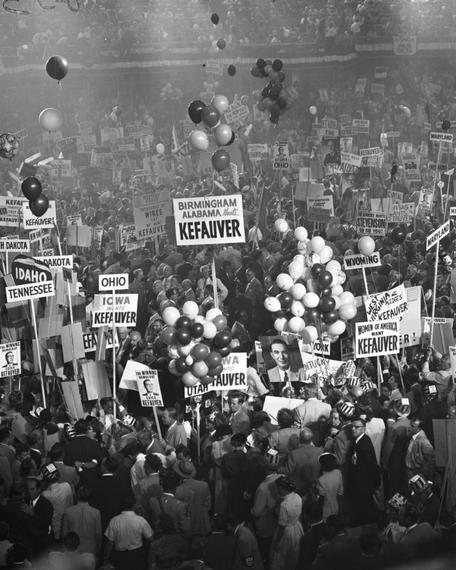As we reflect on the voting results from Iowa and New Hampshire, we should examine what we lost when we switched from open conventions to primaries and caucuses to choose Presidential candidates. I was at the Democratic convention in 1952, when it took three ballots to produce a nominee, Illinois Governor Adlai E. Stevenson, who was not even a declared candidate before the convention. His opponent, Dwight D. Eisenhower, was nominated after multiple ballots at another open convention by the Republicans. This gave voters an excellent choice between two outstanding candidates. Open conventions similarly offered the voters Abraham Lincoln, Franklin Roosevelt, and Wendell Willkie.
I still like the term we used, "open convention," but today pundits prefer "brokered convention" to make it sound like a throwback to the party bosses meeting in smoke-filled rooms, monopolizing the nominating process and excluding the voters. That was what party leaders were trying to get away from after 1968, when the parties replaced open conventions with caucuses and primaries. The current system may be more inclusive in theory, but it is not as representative or informed. It is based on an assumption of widespread participation that has been proven to be false. In reality, the participation is almost microscopic, and takes on weight and authority far beyond its merits.
First results come from Iowa and New Hampshire. Neither has a population representative of the demographics of our country and neither has more than a small percentage of voters who participate. Their delegates have almost no numerical impact on the nomination. But because they are first, they have a disproportionate impact. The effort to get away from party bosses has given us a new set of bosses, extremists of the Left and Right. Less than 1% of the national voting population now dominates the nominating process, and unlike the delegates in an open convention, they are not elected or accountable.
Candidates and media focus on early states like Iowa and New Hampshire because the media would rather report on the contest than the issues. So there is a disproportionate frenzy about these early indicators and it can become a self-fulfilling prophecy. Success in Iowa and New Hampshire translates into more publicity and more money. But it shouldn't. The primary system that was originally intended to make elections more democratic has made them far less so.
Meanwhile, the parties waste their opportunity to present their best ideas and best people to the country. Since the nominees have already been selected before the conventions, television broadcasts at the convention become coronations, dull, and over-managed. Conventions have been televised for more than half a century, but the parties still do not know how to use their free, live time in a direct or compelling way. The "voting" is just a meaningless ratification of what everyone already knows, decorated with balloons. Delegates are like computer cards -- no longer allowed to listen to each other, to negotiate face to face, or to use their best judgment about who would be the best President.
The historic purpose of a national political convention was to bring together Americans from every state to discuss the issues and evaluate the candidates, to look each other in the eye, to debate and weigh the arguments, and then to vote and form a consensus. In 1860, for example, the young Republican Party chose Abraham Lincoln as its candidate in an open, contested process. How would Lincoln do if he had to campaign in Iowa and New Hampshire eleven months before the election?
The open convention of 1952 was the first of seven Democratic conventions I attended. I saw democracy up close. Read past the headlines about the caucus and primaries to see if the stories include any information about the percentage of voter participation. If not, be skeptical about how representative the results are. The caucus and primary system tend to bring out voters who are at the extreme of both sides of the political spectrum. They vote and go home, while an open convention forces people with different views and priorities to work together to find a candidate with broad appeal. Perhaps the issue that unites Americans more than any other right now is the frustration with politics itself. An open convention may be the best way to promote true grassroots participation. And it may be the best way to select nominees who truly represent the best of us.
Note: I thank my daughter Nell Minow and grandson Ben Apatoff for their valuable help with this essay.